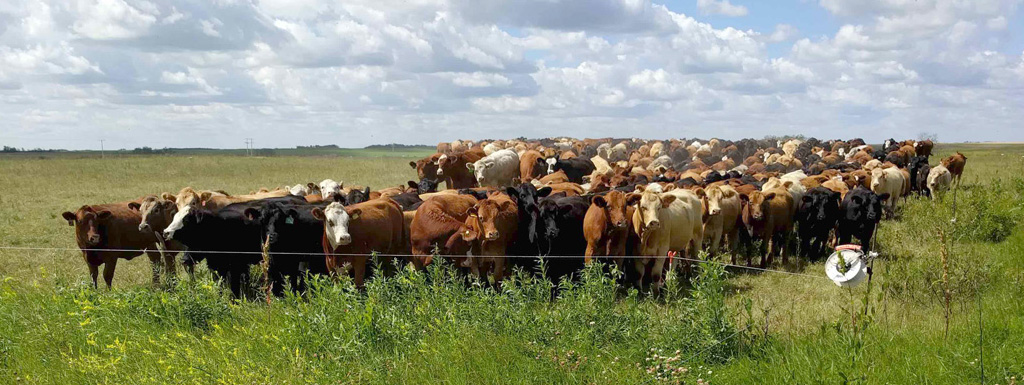Grassroots Carbon Public Benefit LLC launched today, after the merger of Soil Value Exchange and PastureMap. The new company instantly provides scalable, measured, and certified soil carbon storage solutions to companies who want to reduce their carbon footprint. In addition, the merger combines access to regenerative landowners, value generating rotational grazing software, and a soil carbon mapping data solution, with the delivery of proven and independently certified carbon credits. In short, Grassroots Carbon will pay landowners who capture and store atmospheric carbon in their healthy soils.
Grassroots Carbon aims to unlock the massive atmospheric carbon capture storage potential of the grazed pasture and rangelands which cover over one third of the United States and represent a critically threatened native prairie ecosystem. If managed using regenerative techniques that mimic the way ruminants have long roamed on an open prairie, these grasslands could capture and reliably store as much as one billion tons of atmospheric carbon dioxide (CO2) every year and offer an impactful climate crisis solution at a scale that matters.
“As demand for reliable, affordable, and scalable carbon footprint reduction solutions is rapidly growing, we are excited to offer our customers a solution that makes it easier for them to thrive in a carbon constrained world,” says Henk Mooiweer, CEO of Grassroots Carbon. “We bring high quality, measured, and independently certified nature-based carbon capture and storage solutions at the scale our customers need, based on the large network of ranchers using our PastureMap software. Ranchers and farmers can now be paid for the continuous amazing work they do to store atmospheric carbon.”
What sets Grassroots Carbon apart from other carbon credit platforms?
The combined power of Soil Value Exchange and PastureMap is also what sets Grassroots Carbon apart from other carbon credit platforms. Soil Value Exchange brings trusted leadership, already having helped companies including Marathon Oil, Rapid7, and Shopify meet their carbon reduction goals. PastureMap brings a large community of land stewards already employing rotational strategies and sequestering carbon.
The company offers the highest quality soil carbon storage available today, underpinned by robust soil carbon measurements and independent certification.
“We use rigorous soil sampling procedures originally developed under Verra and now allowed by BCarbon. Samples are taken three feet deep and analyzed in a lab to meet strict guidelines for statistical accuracy,” explains Mooiweer.
PastureMap’s software is designed to track grazing records and improve profitability. It drives better grazing management decisions by offering key data at ranchers’ fingertips, from season forecasting, to stocking capacity, to herd movement tracking, and more. And now PastureMap can store the measured soil carbon data on user maps, offering much better insights and transparency.
This combined technology makes for a reliable way to both buy and sell carbon.
So what do farmers think?
Grassroots Carbon’s network of land stewards are regenerating healthy soils. This means they are not only storing carbon, but also improving water quality, preventing erosion, and growing the abundance and diversity of plants, birds, insects, and wildlife. Land managers covering over 100,000 acres of U.S. grazing lands can now get paid for the carbon they capture and store in their healthy soils, an opportunity that excites many.
Loy Sneary, a rancher out of Matagorda County, Texas explains, “As I learned more about the mission of Grassroots Carbon, I was sold that this is exactly the model we want our ranch to be involved with.” Moreover, he explains, the projected payments from Grassroots Carbon will greatly offset his capital costs of switching to Adaptive High Stock Density, a grazing system designed to facilitate flexibility in land use and forage utilization, while optimizing animal performance and soil health goals.
Mooiweer adds that Grassroots Carbon aims to keep trust by offering full transparency and the best economic deal for farmers and ranchers – paying ranchers 80% of the carbon profits.
Growth & Impact
“Our work at Grassroots Carbon is about much more than carbon — it is about regenerating grassland ecology at a scale that matters,” Mooiweer told Raising Regenerative News when asked about the expected impact of the new company.
American grasslands have the capacity to store over one billion metric tons of CO2 year over year, which is about 20% of the American Greenhouse gas emissions. The target set by Grassroots Carbon is to store at least ten million metric tons of CO2 per year by the year 2026.Scale is important not only to reduce atmospheric carbon levels, but also to support ranchers and farmers who restore millions of acres of grazing land, with enormous additional benefits.
According to Lew Moorman, board chair of Grassroots Carbon and Co-founder of Soil Works Natural Capital, “Our goal is to accelerate the move to regenerative farming and the addition of certified carbon credits will be a game-changer for ranchers. The opportunity to create the leading carbon marketplace to accelerate this move was a no brainer. We expect in 20 years we will look back at this as a key moment of change in the food and climate industries.”
To read more about PastureMap and Soil Works Natural Capital, see Regenerative Ag Investment Firm Launches with Acquisition of PastureMap
Sarah Day Levesque is Managing Director at RFSI & Editor of Raising Regenerative News. She can be reached at [email protected].
